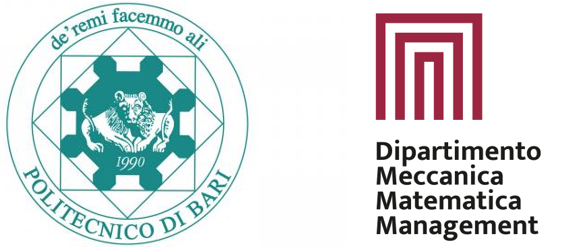
POLITECNICO DI BARI
Politecnico di Bari is an Italian state university founded in 1990 and it is one of the leading institutions for studying engineering and architecture in Italy. Within ADE, the Department of Mechanics, Management and Mathematics (DMMM) is mainly involved. The mission of DMMM is to pursue excellence in research and teaching in the following fields: Biomimetics and tribology of surfaces; Complex Flow Simulation; Dynamics and control of vibrations; Energy Efficiency and Renewable Energy; Innovation in Industrial Plant Engineering; Micromachining, Additive Manufacturing and Reverse Engineering, Mechanical design for materials and structures; Industrial Augmented Reality; Robotics.
The research topics are carried out by the 21 research groups of the Department in more than 30 Laboratories, including four networks of laboratories (EMILIA, MICROTRONIC, TISMA, and Trasforma). The DMMM has been selected by the Italian Ministry of Education, University and Research as a Department of Excellence and has been awarded special ministerial funding for the five years 2018-2022. The department provides 1 Ph.D. course, three bachelor degrees (Mechanical Engineering, Management Engineering, and Aerospace Engineering Systems), three Master Degrees (Mechanical Engineering, Management Engineering, and Aerospace Engineering), and several Double Degrees.
For more details visit their website
ROLE WITHIN THE PROJECT: POLIBA will be responsible of the Soil navigation estimation. Poliba will mainly contribute to increasing the degree of autonomy of an agricultural robot to navigate safely in unstructured environments via traversability assessment of the terrain ahead using a multi-sensor approach. Traversability analysis and the subsequent selection of a danger-free route are prerequisites to accomplish assigned tasks in long-range and long-duration applications. To this end, POLIBA will use the expertise developed in previous and ongoing research in field robotics in general, and specifically on agriculture and planetary exploration robotics. Research activity has been devoted for more than fifteen years to the study of wheel-terrain interaction drawing on the classical Terramechanics theory, and to the development of advanced perception solutions including the adoption of multi-sensor modalities (e.g., stereovision in conjunction with LIDAR) in challenging off-road scenarios. Expertise has been developed within national, European and international research projects, including three FP7/H2020 projects, two fellowships respectively with the Australian Centre for Field Robotics (ACFR) and the Space Robotics Lab of the Tohoku University where specific research was developed on novel methods to enhance mobility of mobile robots on loose terrain, such that lunar and planetary rovers are expected to encounter.

